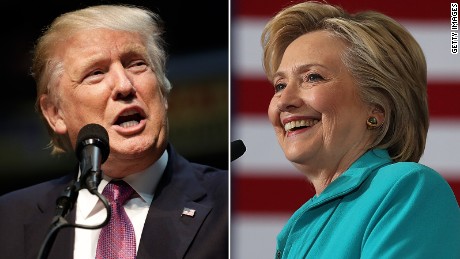The 249-page book, which was co-written with her running mate, Sen. Tim Kaine of Virginia, is set to be published on Sept. 6 by Simon and Schuster (list price $15.99), the day after Labor Day, the traditional kick-off of the fall campaign.
The book -- which includes policy prescriptions on everything from strengthening the economy to defeating ISIS -- is intended to provide a contrast with Donald Trump, whose campaign has been light on policy details.
But when read alongside the book that her husband and Al Gore published in 1992, it offers a glimpse into the many ways that the Democratic Party has drifted to the left over the past quarter-century on everything from crime to trade, from Social Security and welfare to Israel and the Middle East.
Bill Clinton's "Putting People First" declared: "We need to put more police on the streets and more criminals behind bars" (p. 71).
Hillary Clinton's book, by contrast, calls for reforming the criminal justice system, expanding the use of body cameras, and ending "the era of mass incarceration."
"We should work together to pursue alternative punishments for nonviolent offenders where appropriate," write Clinton and Kaine. "We don't want to create another 'incarceration generation'" (p. 198).
Trade
Bill Clinton and Gore promised to "support a North American Free Trade Agreement" (p. 156), a pledge he made good on in the White House.
The Clinton-Kaine book, by contrast, promises to "review" trade agreements like NAFTA that are "already on the books" and promises to oppose the controversial Asian trade deal known as the Trans-Pacific Partnership (TPP).
"[W]e oppose the TPP -- and that means before and after the election," write Clinton and Kaine.
Social Security
The Democratic Party has also moved to the left on the issue of Social Security -- a shift that is reflected in Clinton's book.
Bill Clinton's book promised to "protect the long-term solvency of Social Security" (p. 140).
Hillary Clinton's book, by contrast, promises to reject "years of mythmaking claiming we cannot afford Social Security and that the only solution is to cut the benefits on which 90 percent of Americans seniors rely." (p. 87).
Clinton and Kaine propose expanding Social Security for "those who need it most and who are treated unfairly by the current system -- including women who are widows" (p. 88)
Clinton calls for paying for this expansion of Social Security benefits by "asking the wealthiest to contribute more" (p. 88).
Welfare
As part of his effort to move the Democratic Party to the center, Bill Clinton made welfare reform a cornerstone of his 1992 presidential bid.
"No one who can work should be able to stay on welfare forever," wrote Clinton and Gore in their book. (p. 164).
Hillary Clinton's book is silent on this front.
Israel
The Israeli-Palestinian conflict is another area where the Clinton books diverge.
In 1992, Bill Clinton and Al Gore wrote "We oppose the creation of an independent Palestinian state" (p. 123).
Writing in 2016, Clinton and Kaine say in their book "... we refuse to give up on the goal of two states for two peoples." (p. 125).
Health Care
One area where Hillary Clinton's book comes off as more moderate than her husband's is on the issue of health care, a contentious issue that both Clintons wrestled with in the White House.
Bill Clinton's book proposed creating a health standards board that would establish an annual health budget for the nation to limit both public and private expenditures.
Hillary Clinton, by contrast, does not propose capping national health spending.
Instead, she proposes letting people over 55 to buy into Medicare, supporting efforts across 50 states to create a government-run public option, and providing a new "progressive, refundable tax credit of up to $5,000 per family" to help with out-of-pocket health-care costs







